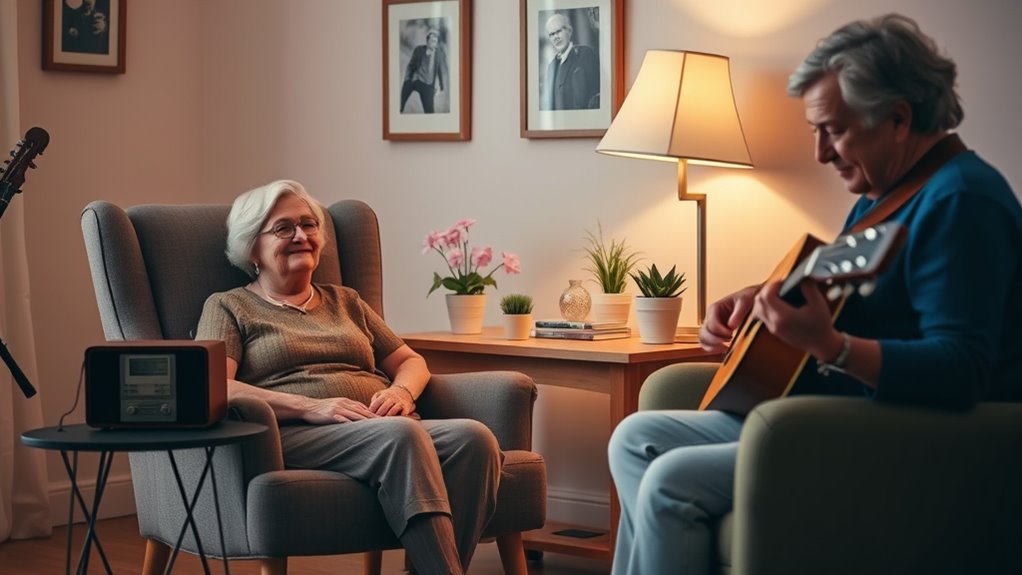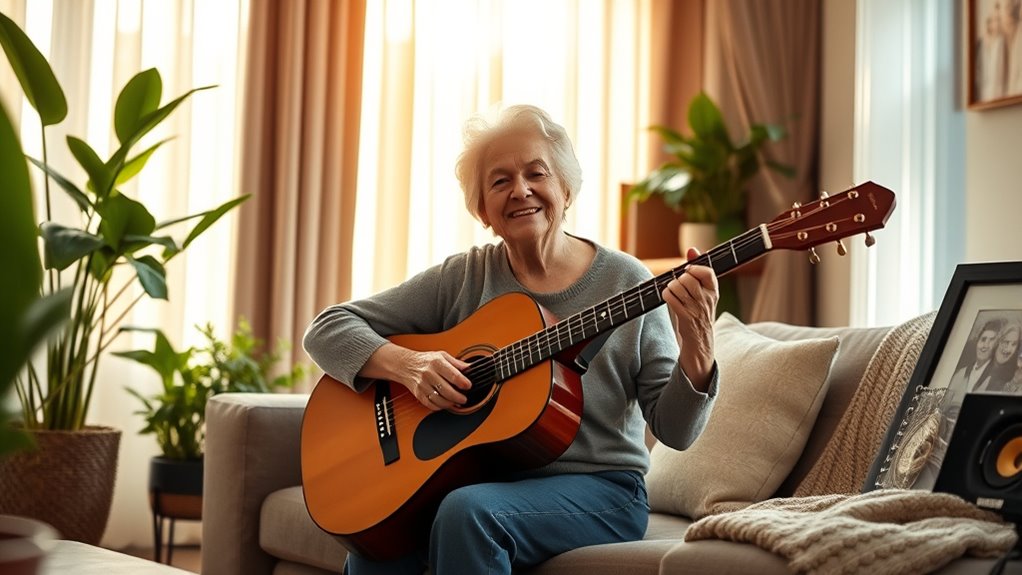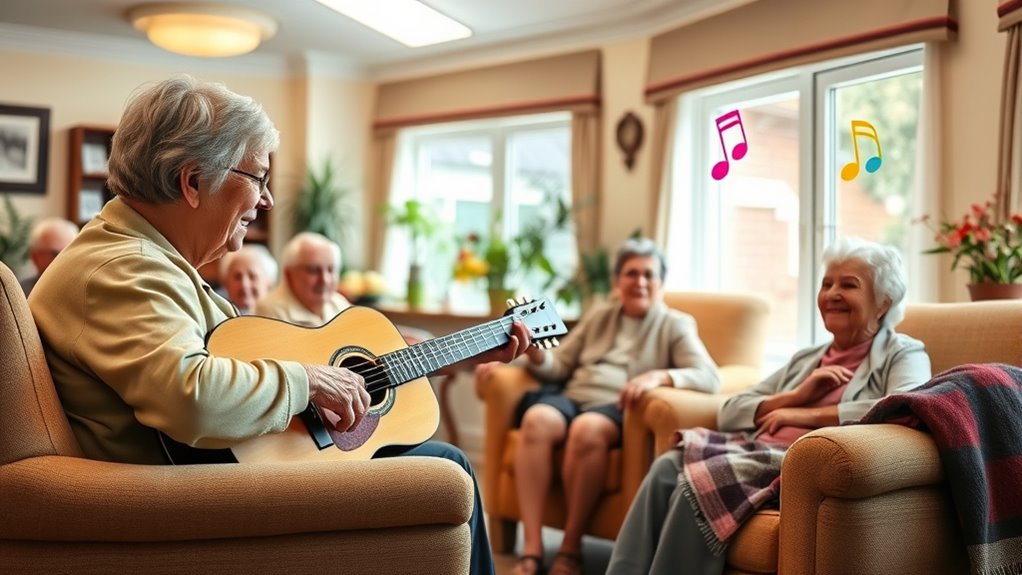Music therapy offers many benefits for seniors, helping improve physical health, such as balance, coordination, and heart health. It also boosts mental well-being by reducing anxiety and depression, and supports memory, especially in those with dementia. Additionally, engaging with music fosters social connections and emotional resilience, making everyday life more joyful. If you’re curious about how these benefits happen and how to include music therapy in daily routines, there’s more to explore below.
Key Takeaways
- Enhances memory and cognitive function, aiding individuals with dementia and Alzheimer’s disease.
- Reduces depression, anxiety, and emotional stress, promoting mental well-being.
- Improves physical health through movement, coordination, and balance activities.
- Strengthens social bonds via group music sessions, reducing feelings of loneliness.
- Supports cardiovascular health by promoting relaxation and rhythmic exercises.
What Is Music Therapy and How Does It Work?

Music therapy is a structured, evidence-based clinical approach that uses music to improve your physical health, emotional well-being, and cognitive health. You participate actively through singing, playing instruments, or listening, all designed to promote healing and support your overall wellness. Additionally, music therapy can incorporate holistic care models that address social and emotional factors influencing health. Certified music therapists create personalized sessions that incorporate activities like group singing, instrument playing, or receptive listening, ensuring each individual’s needs are met without requiring prior musical talent. This approach relies on proven methods to engage your mind and body, making it accessible and effective. Ethical Hacking principles, such as careful planning and safeguarding client confidentiality, can also inform the development of personalized therapy programs to ensure safety and trust. Emphasizing client-centered care, music therapy adapts to the unique preferences and responses of each individual for maximum benefit. Incorporating sleep and mental health considerations can further enhance the effectiveness of music therapy, as restful sleep supports emotional regulation and cognitive function. Moreover, understanding the neuroscience of music can help tailor interventions that stimulate specific brain regions associated with memory, mood, and cognition, enhancing therapeutic outcomes.
Physical Health Benefits of Music Engagement in Older Adults

Engaging with music can help you improve your balance and flexibility, making daily activities easier and safer. Movement-based activities like dancing or stretching to music also support your heart health and strengthen muscles. Additionally, participating in music therapy can enhance your overall well-being by reducing stress and promoting mental sharpness, similar to how sound vibrations are believed to enhance cellular regeneration and overall health. Research also shows that music’s ability to promote cultural narratives can foster a sense of community and emotional connection among older adults.
Enhances Balance and Flexibility
Activities like dancing, tapping, and playing instruments actively improve balance, coordination, and flexibility in older adults. Engaging with musical movement encourages you to move rhythmically, strengthening your muscles and supporting physical stability. Access to resources can further enhance your participation in these activities. These exercises help retrain gait and enhance walking patterns, making everyday activities easier and safer. Regular participation in music-based activities promotes mobility and can reduce your risk of falls. Incorporating rhythmic, musical movements into your routine can also enhance neuroplasticity, helping your brain adapt and improve motor functions as you age. Additionally, engaging with music can stimulate brain plasticity, which is vital for maintaining cognitive and motor skills in older adults. Research shows that music therapy can also stimulate neuroplasticity in the brain, aiding recovery from injury and supporting cognitive resilience. By integrating these exercises into your daily life, you can maintain or even improve your balance and flexibility as you age. This not only supports your physical health but also helps preserve your independence.
Supports Cardiovascular Health
Participating in rhythmic musical activities can greatly benefit your cardiovascular health. Music therapy that involves slow, relaxing melodies helps reduce cortisol levels, which supports vascular function.
Listening to calming music lowers your blood pressure and heart rate, promoting overall heart health. Engaging in rhythmic activities like dancing or tapping to music enhances circulation and strengthens your heart muscle.
These activities also improve respiratory function and oxygen intake, further supporting cardiovascular wellness.
- Reduce stress-related risks through music-based interventions
- Lower blood pressure and heart rate with calming melodies
- Strengthen your heart through rhythmic activities and dance
Mental Health Improvements Through Music Therapy

Music therapy has proven to be a powerful tool for improving mental health among older adults. It reduces depression, anxiety, and stress, leading to better overall well-being. Engaging with music allows you to express emotions that words often can’t capture, supporting emotional expression. Group sessions encourage social interaction, which helps lessen loneliness and boosts mental resilience. Listening to or performing music elevates mood and motivation, providing stress relief and fostering a positive outlook. Incorporating music therapy techniques can further enhance these mental health benefits. Understanding the Law of Attraction principles can help individuals cultivate a positive mental state, amplifying the benefits of music therapy. Practicing positive affirmations alongside music therapy can enhance emotional well-being. Additionally, engaging in musical improvisation can stimulate creativity and emotional release, further supporting mental health. Recognizing the importance of diverse music styles can help tailor therapy sessions to individual preferences, maximizing engagement and effectiveness. Here’s a breakdown of how music therapy impacts mental health:
| Benefit | Description |
|---|---|
| Emotional expression | Facilitates processing feelings beyond verbal communication |
| Stress relief | Reduces anxiety and tension through calming music |
| Social interaction | Promotes connections, decreasing loneliness |
| Mood elevation | Boosts motivation and positivity |
| Mental resilience | Strengthens ability to cope with challenges |
Supporting Memory and Cognitive Functions in Dementia and Alzheimer’s Disease

Music therapy can profoundly boost memory recall in individuals with dementia and Alzheimer’s by using familiar songs to trigger past experiences. Engaging with music also encourages cognitive activity, helping to maintain mental sharpness. Incorporating personalized playlists that feature meaningful songs enhances the effectiveness of therapy sessions. Additionally, understanding the importance of color accuracy and visual cues can further support cognitive engagement during therapy. Moreover, incorporating emotional expression through music can deepen the therapeutic impact by fostering a stronger emotional connection. Utilizing appropriate sound levels can also optimize the therapeutic environment, ensuring comfort and responsiveness during sessions. Recognizing the significance of angel number symbolism can provide additional emotional support and motivation for patients during their therapy journey.
Memory Recall Enhancement
Have you ever wondered how melodies from the past can open memories hidden deep within the mind? Music therapy taps into this power to boost memory recall in dementia and Alzheimer’s patients. Familiar songs can evoke emotional responses and reconnect you with personal experiences long buried by cognitive decline.
Engaging with music stimulates brain regions linked to memory and improves cognitive functions. Repetition of tunes helps maintain verbal recall and episodic memory. Incorporating antiques or vintage items related to the music era can deepen the nostalgic experience and further enhance memory triggers. Additionally, understanding the environmental factors affecting cognitive health can optimize therapy outcomes. For example, creating a comfortable setting can encourage more effective engagement during sessions. Creating a supportive environment is essential for maximizing therapeutic benefits, especially in settings tailored for the elderly.
To maximize benefits:
- Listen to familiar songs from your youth
- Sing along to reinforce memory pathways
- Play personalized playlists to trigger specific memories
This approach not only supports cognitive engagement but can slow the progression of memory loss, offering a meaningful way to preserve your sense of identity amid cognitive decline.
Cognitive Engagement Strategies
Engaging with musical activities like singing, rhythm exercises, and pattern recognition can markedly boost cognitive functions in individuals with dementia and Alzheimer’s. Music therapy stimulates neural pathways linked to memory, attention, and executive functions, supporting mental stimulation.
Familiar songs and melodies help access long-term memory, often remaining intact despite cognitive decline. Group music sessions promote social interaction, which enhances cognitive engagement and helps reduce feelings of isolation.
Creating personalized playlists from past experiences triggers emotional responses and reinforces personal identity, aiding cognitive retention. Regular participation in music-based exercises can slow memory decline, improve concentration, and bolster overall mental functioning.
How to Incorporate Music Therapy Into Daily Life for Seniors

Incorporating music therapy into daily routines can substantially enhance seniors’ emotional well-being and social connection. To do this effectively, consider these strategies:
- Use accessible music devices like simplified MP3 players or smart speakers to make listening easy and enjoyable.
- Schedule specific times for activities such as listening, singing, or dancing to build consistency and habit.
- Encourage participation in group activities like sing-alongs or musical games to foster social interaction and emotional bonds.
Types of Music Therapy and Their Specific Applications

Understanding the different types of music therapy can help you choose the most effective approach for seniors. Active therapy involves participation in singing, instrument playing, and dancing, promoting physical well-being and social engagement. Receptive therapy focuses on mindful listening to curated music, which can evoke memories and improve mood, especially for those with dementia. Both methods require no prior musical talent and are tailored to meet individual needs by certified therapists.
| Type | Application |
|---|---|
| Active Therapy | Singing, dancing, songwriting to boost physical health |
| Receptive Therapy | Listening to music to reduce stress and enhance mood |
| Both | Foster emotional benefits and social connection |
How Music Helps Reduce Stress and Promote Relaxation

Have you ever noticed how calming music can instantly ease your stress? Music therapy offers a powerful way for older adults to find relaxation. Listening to relaxing music can lower cortisol levels, helping reduce stress and promote calmness. Engaging with soothing melodies also relaxes muscles and decreases heart rate, supporting overall relaxation.
Calming music lowers stress, relaxes muscles, and promotes mental tranquility in older adults.
In stressful situations, like preoperative care, music profoundly diminishes anxiety more effectively than standard methods. When you listen to relaxing music, you evoke positive emotional responses that enhance mental tranquility.
Here’s how music therapy helps reduce stress:
- Lowers cortisol levels for immediate stress relief
- Eases muscle tension and heart rate
- Boosts positive emotional responses for relaxation
The Role of Music in Enhancing Social Connection and Emotional Well-Being

Music plays a pivotal role in strengthening social bonds and boosting emotional well-being among older adults. It encourages group participation and shared musical experiences, which help combat loneliness and foster social connection. Engaging with music activates emotional centers in the brain, allowing seniors to express feelings and find emotional relief beyond words. Participating in musical activities reduces social anxiety and enhances interpersonal skills, promoting social engagement. Incorporating the following table highlights how music impacts emotional and social aspects:
| Benefit | Effect |
|---|---|
| Social connection | Builds community and belonging |
| Emotional well-being | Evokes positive memories and identity |
| Shared experiences | Strengthens bonds and reduces loneliness |
Through music, seniors enjoy richer social lives and improved emotional health.
Practical Tips for Using Music to Support Healthy Aging

To effectively support healthy aging through music, it’s important to implement practical strategies that make musical engagement accessible and meaningful.
Incorporate personalized playlists by decade, genre, or artist to evoke positive memories and encourage emotional connection.
Use user-friendly devices like Amazon Alexa or specialized music players to simplify access, especially for those with limited technical skills.
Schedule regular music sessions—either group or individual—to boost social activity, improve mental health, and promote physical activity.
Consider selecting calming, slow-tempo music to reduce stress, agitation, and cortisol levels, particularly for seniors with dementia.
Encourage loved ones and caregivers to participate, making music a consistent part of daily routines.
These elderly benefits highlight how music therapy fosters healthy aging by enriching emotional, social, and physical well-being.
Frequently Asked Questions
How Does Music Benefit the Elderly?
You might wonder how music benefits the elderly. When you engage with music, it helps reduce stress, lowers blood pressure, and boosts your mood.
Listening regularly can also improve memory, especially for those with dementia or Alzheimer’s.
Music’s emotional power helps you relax, fight depression, and stay mentally sharp.
What Is Music Therapy for the Elderly?
Imagine a gentle bridge connecting you to better well-being—that’s what music therapy offers. For the elderly, it’s a tailored approach where certified therapists design activities like singing, playing instruments, or listening to favorite tunes.
You don’t need talent; just an open mind. Whether in groups or alone, this evidence-based practice nurtures your physical, emotional, and cognitive health, enriching your daily life with the soothing power of music.
What Are the Positive Benefits of Music Therapy?
You’ll find that music therapy offers many positive benefits. It helps reduce your stress, anxiety, and depression, making you feel happier and more relaxed.
Engaging with music can boost your physical activity, improve your balance, and support your heart health.
Additionally, participating in group music activities helps you connect with others, fight loneliness, and keep your mind sharp by triggering positive memories and emotions.
What Ages Benefit From Music Therapy?
Imagine a garden that blooms at every age—that’s how all adults, from young to old, benefit from music therapy. You might be surprised, but research shows even centenarians, over 100 years old, experience improvements.
As you age, your reliance on music for connection and mood grows stronger. Whether you’re 65 or 85, music therapy offers physical, emotional, and cognitive benefits, making it valuable for everyone across the lifespan.
Conclusion
As you explore the transformative power of music therapy, you begin to realize its potential to unlock hidden memories, soothe restless minds, and foster genuine connections. But the true impact goes deeper—what if these melodies could hold the key to your loved ones’ well-being in ways you never imagined? Stay tuned, because the journey into music’s healing magic is just beginning, and the possibilities for enriching lives are more profound than you might think.









